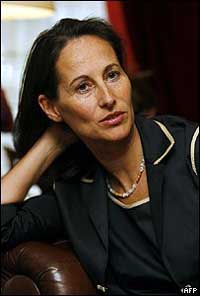France charmed by Socialist who wants to be its first woman president
Segolene Royal sometimes breaks into a "Mona Lisa" smile: enigmatic, lips curved slightly. It makes critics ask, what is the Socialist presidential hopeful hiding?

Other times, she flashes a full-fledged grin. Fans hope that smile could carry the 53-year-old to the Elysee Palace next spring, and it's unlike anything else in the intense, serious world of French politics.
Royal is a woman in a sea of men in suits. But that's just part of her appeal. She is creating a whole new political attitude, grass-roots and upbeat.
Critics wonder whether there is much substance behind the image.
With seven months until France's presidential elections, voters are craving change in leadership style and vision after more than a decade under 73-year-old conservative President Jacques Chirac, who is not expected to run again.
Royal, surprising some and irritating others, has become the main opposition Socialist Party's most likely presidential candidate by far, overshadowing all other hopefuls including Francois Hollande, the party boss, who also happens to be her romantic partner and the father of her four children.
Boosting her bid, former Prime Minister Lionel Jospin who led the Socialists to a disastrous third-place finish in the last presidential election announced Thursday he will not run, though he did not say which candidate he would support.
If Royal, a lawmaker and former family minister, wins the nomination in November, she will likely face off against Nicolas Sarkozy, the conservative interior minister tough on crime and illegal immigration. Both are pragmatic Baby Boomers and mavericks, and both cultivate reputations as political outsiders untainted by their parties' failings.
They promise to break with the Chirac era, and from politicians disconnected from ordinary people. Royal's slogan is "Desires for the Future." Sarkozy's Union for a Popular Movement asks: "Let's Imagine the France of Tomorrow."
By focusing on the future, they have honed in on a collective French anxiety: troubled youths. Last October, riots exploded in poor neighborhoods, with immigrants' teenage children setting thousands of cars on fire.
Springtime street demonstrations by middle class university students then forced the government to overturn a labor reform. Both protests were spurred in part by the 22 percent unemployment rate for France's young.
In Sarkozy, voters would get a disciplinarian who says France can no longer enjoy so much downtime and vacation if it wants healthy businesses and job opportunities.
Royal embodies the hope that a woman might bring solutions where men have failed.
Subscribe to Pravda.Ru Telegram channel, Facebook, RSS!





